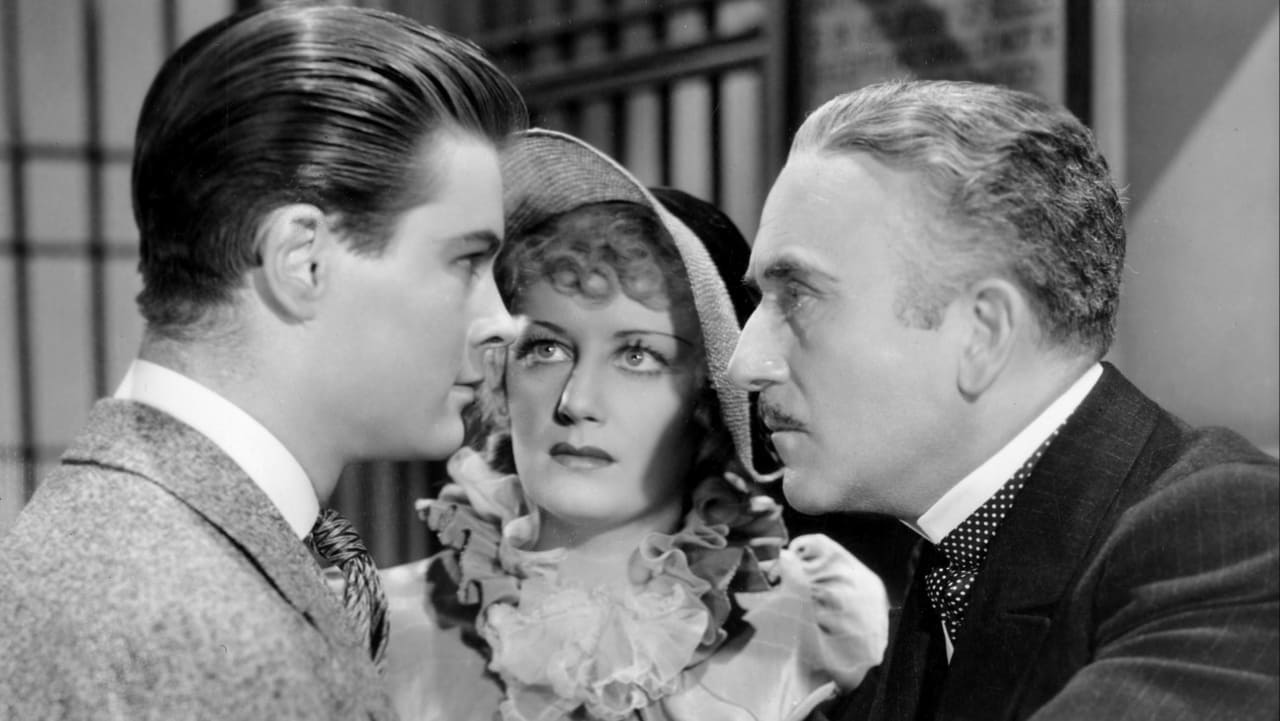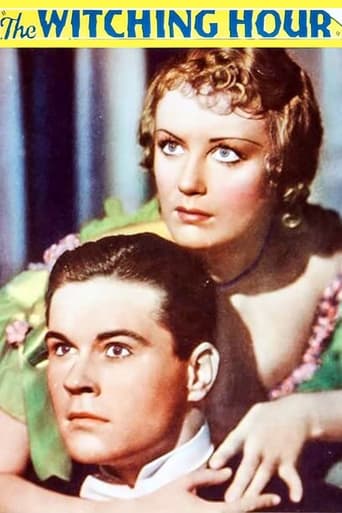

Although based on an old-fashioned stage play and, as a result, almost completely dialogue-bound, "The Witching Hour" (1934) turns out to be a much more involving movie than you would expect, thanks to its superior cast, led by Sir Guy Standing and John Halliday. True, director Henry Hathaway was not exactly at home in a court-room. Real locations - particularly locations that were hard to reach and had rarely, if ever, previously been invaded by a motion picture unit - were his number one choice. Nonetheless, Hathaway certainly gives this film a most welcome dose of vitality.Hathaway is ably assisted , of course, by all the players. None of them put a foot wrong. And it should be mentioned that their performances are all their own work. Hathaway does not direct dialogue. He expects his players not just to know their lines, but to know how they should be played!
... View MoreProvided you understand that what happens is impossible AND you can suspend disbelief, then you'll enjoy the film. All I know is that with all the training I've had in hypnotherapy, I would sure use these powers for evil if they worked like they did in the movie!!Jack Brookfield (John Halliday) has an amazing ability to read people's thoughts and also has a very strong and forceful personality. Without realizing it, he hypnotizes a young man and Brookfield's hatred of another man gets the hypnotized guy to commit murder to please Brookfield! It's a bit odd...and the second half is all about the court case which follows.The film is very original and interesting. Just understand that you cannot project your thoughts onto others to get them to kill...believe me, I have tried!
... View MoreFrom watching The Witching Hour, you find out one thing: William Frawley (Fred Mertz) looked the same at 37 as he did in his fifties and sixties.The story concerns a man, Jack Brookfield (John Halliday) whose daughter is engaged to Clay Thorne (Tom Brown). Brookfield has a strong sixth sense - he calls them hunches - and they rarely let him down, though he refuses to use them for gambling. One night he sees that Clay is terrified of a cat's eye ring and tries to convince him it's nothing. In the midst of their conversation, a man arrives, and he and Jack have a confrontation which ends in Jack threatening to kill him and ordering the butler to throw him out. As Clay leaves, his future father-in-law tells him to hold onto the ring and again reinforce that it's nothing to fear.The following day, the man who visited Jack is found dead after Clay goes to his place and kills him. Clay is arrested but has no defense. He doesn't remember anything about the murder.Very good movie, with an expected dose of melodrama, based on what I think is a false premise but probably was believed back then. I don't think hypnotism can make you do things you wouldn't ordinarily do. However, that's what makes the film fun.The other question is, is it hypnosis or the power of Jack's mind that brings on the event? Don't know.Sir Guy Standing is wonderful as the Judge, a friend of Clay's mother, who, though long retired, is persuaded to take the case.Besides the familiar Frawley as the jury foreman, Jack's daughter is played by Judith Allen who, like Alice White, had a more interesting life off-screen than on, often making the tabloids. Tom Brown enjoyed a 55-year career in show business, including playing Al Weeks on General Hospital.Fast moving and well-directed by Henry Hathaway, this is a lost gem well worth seeing.
... View More"The Witching Hour" by Augustus Thomas had first wowed Broadway audiences in 1907 with it's sensational mix of murder, hypnotism and mental telepathy. It had a respectable run of 212 performances. It was filmed in 1916 and was successful enough for Paramount to re-make it in 1921 with William Desmond Taylor directing. Paramount were impressed enough to re-make it again in 1934 (even though it's origins were beginning to wear a bit thin) but a young Henry Hathaway was able to give it a bit of zest. John Halliday, in my opinion, was probably one of the most under-rated actors of the early thirties. He played lawyers, men about town and even psychopathic killers with the same urbane and witty charm and many a movie has been turned from a bore to a piece of sophistication just by having Halliday in the cast.Jack Brookfield (John Halliday) is a clairvoyant who uses his hypnotic powers to see his gambling house runs smoothly and that the police are always thwarted whenever they make surprise raids. He is having his rooms re-decorated by a young architect Clay Thorne (Tom Brown), who is also engaged to Jack's daughter (Judith Allen). He has never used his mental telepathy for anything bad - he never gambles etc, he is not even sure how he can foresee all these things but when Clay confesses in hysteria that he has always been frightened of cats-eyes (Jack has a strange ring that catches Clay's eye) events collide to land Clay in court fighting for his life.Frank Hardmuth (Ralfe Harold) is a disgruntled patron who has been turned away from the gambling den and in spite has called the police. The next day Clay is arrested for Hardmuth's murder but he has no idea how it happened. Unbeknownst to everyone Clay was hypnotised when he gazed at the ring and when Jack muttered to Frank that "someone will go to your office and shoot you right between the eyes" - Clay acted on command. The rest of the film is a court room drama, as a believing old lawyer (Sir Guy Standing) tries to convince the skeptical jury (William Frawley, from "I Love Lucy", 20 years earlier and he still looks the same age) that hypnotism does exist. I thought, like the other reviewers, that it is a movie well worth watching. I also think the period setting helps to keep it believable. Gertrude Michael had a nice cameo as the ghost of the lawyer's lost love, Margaret Price.Highly Recommended.
... View More